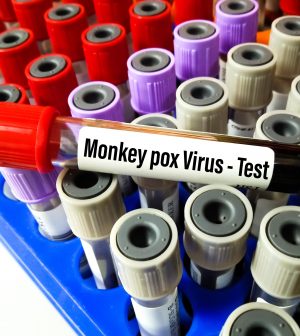- Could Artificial Sweeteners Be Aging the Brain Faster?
- Techniques for Soothing Your Nervous System
- Does the Water in Your House Smell Funny? Here’s Why
- Can a Daily Dose of Apple Cider Vinegar Actually Aid Weight Loss?
- 6 Health Beverages That Can Actually Spike Your Blood Sugar
- Treatment Options for Social Anxiety Disorder
- Understanding the Connection Between Anxiety and Depression
- How Daily Prunes Can Influence Cholesterol and Inflammation
- When to Take B12 for Better Absorption and Energy
- Epsom Salts: Health Benefits and Uses
Monkeypox Not the Next Pandemic, WHO Expert Says

The hundreds of cases of monkeypox being reported worldwide likely won’t turn into a pandemic, but much remains unknown about the disease, the World Health Organization’s top expert on the illness said Monday.
Dr. Rosamund Lewis said it’s not exactly understood how monkeypox is spreading or whether the halt of mass smallpox immunization decades ago may somehow be boosting its transmission, the Associated Press reported.
What is clear is that the vast majority of cases are in gay and bisexual men, and that group needs to be especially careful, she said in a public session, the AP reported.
“It’s very important to describe this because it appears to be an increase in a mode of transmission that may have been under-recognized in the past,” Lewis said.
With these latest cases, she warned, there is a higher proportion of people with lesions that are more concentrated in the genital region and sometimes nearly impossible to see.
“You may have these lesions for two to four weeks [and] they may not be visible to others, but you may still be infectious,” she said, though she added that public health officials are not worried about rapid spread of the virus.
“At the moment, we are not concerned about a global pandemic,” she said. But, “we are concerned that individuals may acquire this infection through high-risk exposure if they don’t have the information they need to protect themselves.”
Last week, the WHO said that 23 countries that haven’t previously seen monkeypox had reported more than 250 cases, and the U.K. on Monday announced another 71 cases, according to the AP.
It’s unknown whether the disease is being transmitted by sex or just close contact between people having sex, and the threat to the general population is low, Lewis noted. Monkeypox can spread through close physical contact with an infected person, their clothing or bedsheets.
While the majority of cases are in gay and bisexual men, anyone is at risk for monkeypox, regardless of their sexual orientation, Lewis cautioned.
Most of those struck by monkeypox have fever, body aches, chills and fatigue. People with more serious illness may develop a rash and lesions on the face and hands that can spread to other parts of the body, the AP reported.
More information
Visit the U.S. Centers for Disease Control and Prevention for more on monkeypox.
SOURCE: Associated Press
Source: HealthDay
Copyright © 2026 HealthDay. All rights reserved.










